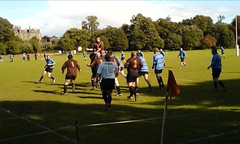there's a scene in
28 Days Later, a film that haunts me for some reason, in which the family on the run from a
fatal infectious pandemic (I hope I'm just kidding with that link there) finds a grocery store, abandoned since the initial infection 28 days earlier. they run around throwing food into their baskets—soda, bags of chips, boxes of whatever, cans, and then we see the father running into the produce section which is, as one might imagine, a pile of mold. except for one section of apples or similar fruit, which looks perfect. he shouts with irony: thank god for irradiation and genetic engineering! [all quotes and summaries of this film are from my foggy memory of seeing it years ago, so don't hold me to this...]
the film is set in England and with its strident anti-GMO stance the moment is particularly striking. It makes you wonder if the entire produce section in the US would be, well, just fine after 28 days. probably not. But likely more than just one kind of apple would have survived.
which brings me to food and slow food. OddsareOne's tales of
debaucherous eating and cooking and living over the course of one afternoon also struck a chord. not only of missing friends far away, as one might expect, but also of celebrating a life-shift toward cooking and away from preparing/zapping/grabbing food. It's been several years since Sam and I seriously attempted to formulate strategies for eating non-takeaway, non-processed food, and it meant a decent amount of change to our lives, including not going into the middle of the grocery store, purchasing more fresh veggies and meats, and cooking almost every meal, including breakfast and lunch. this is extremely difficult, not least because in the US, aside from the major urban areas and coasts where most of our peergroup lives, it's very difficult to purchase fresh veggies and non-processed food. the "instant grits" selection at our Food Lion in Fredericksburg was enough to make you want to give up entirely.
Liz gave me a
cookbook last Xmas on sustainable cooking which was fascinating. not so much because of the recipes, but because it was written by a team of chefs in Oregon who tailored the recipes to what they could get locally. they were big proponents of the "local food" movement, supporting local farmers, stopping the pollution of the environment by eliminating the plane flights through which most of us get our foods, eating seasonally. as a result, sad to say, the recipes didn't so much work in the middle of PA, where we had a lovely grocery store but not the particular kind of mushroom, onion, fish, or whatever called for in the recipe. but it was an interesting and illuminating read because it revealed the limitations of this "slow food" "local food" movement in the US: it's fine for those (wealthy folks) in the big cities with access to exotics like "olive oil" but for those in rural areas, or even just outside of those big cities (as Fredericksburg is), finding the local, the clean, the fresh is a huge chore and sometimes impossible. This of course links back to
OaO's blog about finding enlightenment: sure, if you're not worrying about money or where you're going to sleep that night, it's easier to devote yourself to things like slow food or meditation. But even if you want desperately to eat locally and avoid processed foods, and you live outside of an urban area, you must make what I consider to be a superhuman effort to find the organic farm that perhaps delivers veggies to your door once every two weeks, or travel to the farmer's market (that's open only 6 months out of the year) to get your food, or drive an hour each way to the nearest whole food-type store, or spend several weeks canning and preserving, as many people do, but again, few have time for this.
and the UK is not immune to this class-division in what goes into the body. we went into this store called
"Iceland" yesterday to see what it was: it's a store entirely made up of packaged frozen food. poor folks and pensioners shopped there. we fled back to our farmer's market, french festival, best-butcher-in-wales lives, but it was haunting as well. how do we stop this madness?





